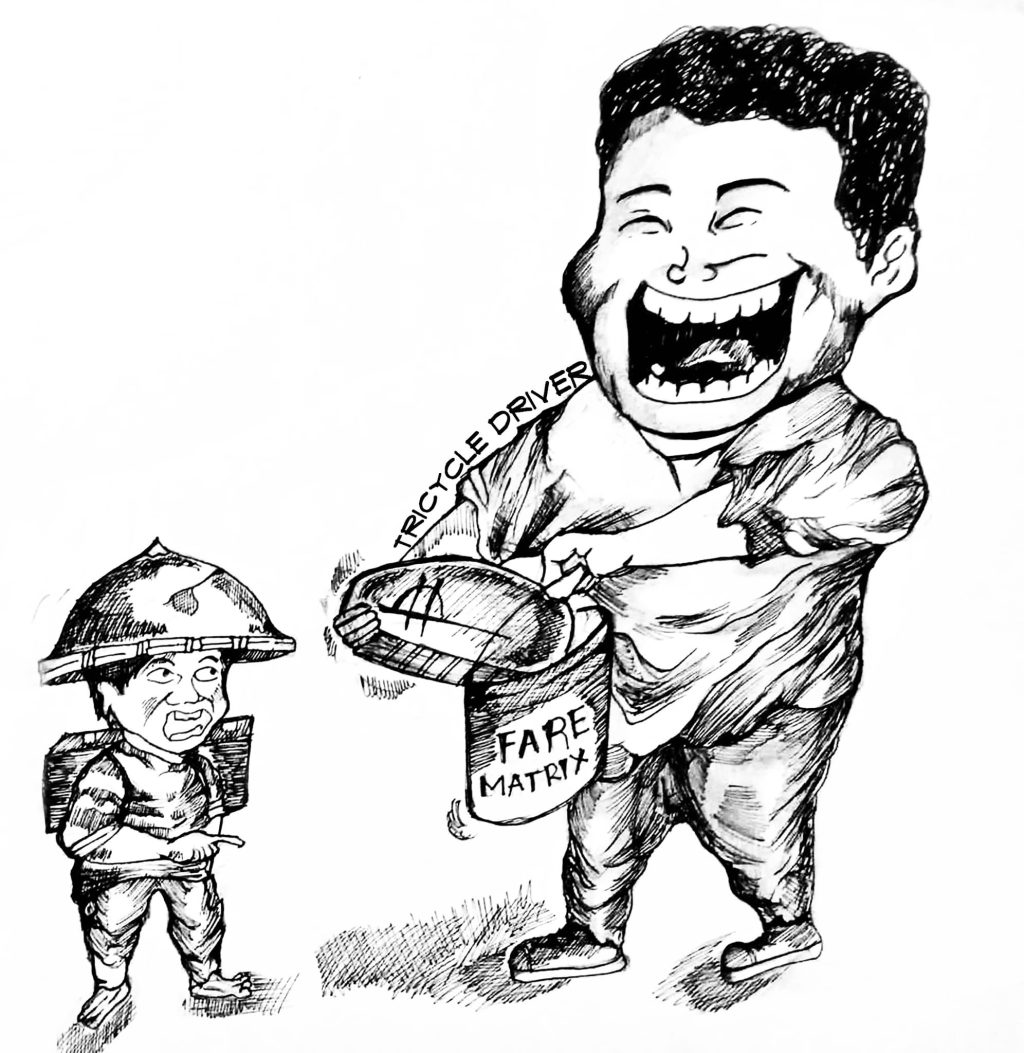Fair Fare, You Should Be Aware
Tricycles are a mode of transportation that became part of daily life in Ilocos Norte, acting as the basic mode of transportation for countless residents, students, and workers. Whether it’s for a quick trip to the market or a commute from rural barangays to the city center, these three-wheeled vehicles are crucial in connecting people across the province as it is small, versatile, and can fit almost anywhere that normal taxis or cars can’t. However, as it offers convenience, a growing problem has been festering beneath the surface—many drivers and operators are disregarding the official fare matrix, leading to frustration among commuters and raising concerns about fairness and accountability in the transport sector.
The fare matrix is supposed to be a safeguard, ensuring that both passengers and drivers are treated fairly. It is designed by local government units (LGUs) to set rates that consider the cost of living, fuel prices, and the distance traveled. In theory, it balances the needs of drivers to earn a decent living with the rights of passengers to pay a reasonable fare.
Unfortunately, many tricycle drivers in Ilocos Norte do not follow this matrix. There are widespread reports of drivers overcharging passengers, especially students and tourists, often demanding fares that are significantly higher than the rates prescribed by the official matrix. This issue is particularly prevalent in cities like Laoag and Batac, where commuters frequently complain about arbitrary fare hikes, especially during peak hours or in areas where demand is high.
The impact of these fare discrepancies is significant, especially for those who rely on tricycles as their primary mode of transport. For many in Ilocos Norte, tricycles are not a luxury but a necessity. Students depend on them to get to school, workers need them to reach their jobs, and vendors use them to transport their goods. When drivers charge more than the official rates, it places an additional financial strain on these individuals, many of whom are already struggling to make ends meet.
Consider a common scenario reported by local commuters. A student taking a tricycle from their home to school in Laoag might expect to pay Php 20 according to the fare matrix, but instead, they are charged Php 40 or even more by the driver. Over time, these overcharges accumulate, making daily commutes increasingly stressful and financially draining. The burden is even heavier on low-income families, who have fewer alternatives and less budget flexibility. In rural areas, where transportation options are limited, residents have no choice but to pay whatever the driver demands.
While the plight of commuters is evident, it’s also crucial to consider the perspective of tricycle drivers. Many drivers argue that the current fare matrix does not accurately reflect the costs of operating a tricycle. With rising fuel prices, maintenance expenses, and boundary fees that they have to pay to operators, many drivers find themselves with barely enough profit to make a living. As a result, they feel compelled to charge higher fares to cover their expenses and support their families.
In interviews with local media, some drivers have expressed their frustrations, stating that if they strictly followed the fare matrix, they would struggle to survive financially. This sentiment is widespread among drivers who feel they are stuck between complying with regulations and facing the harsh economic realities of their profession.
But while the drivers’ concerns are understandable, allowing the current situation to continue unchecked is not a solution. The fare matrix is in place for a reason, and it must be respected to ensure fairness and order in the public transport system. The local government has a crucial role to play in enforcing these regulations and holding drivers accountable when they fail to comply.
However, enforcement has been inconsistent at best. There are occasional crackdowns on fare violations by LGUs, but these efforts are often sporadic and do not address the root causes of the problem. More consistent monitoring and stricter penalties for non-compliance are needed to deter drivers from overcharging passengers.
Public awareness is another critical aspect that needs attention. Many passengers are unaware of the official fare rates and do not realize they have the right to challenge overcharges. LGUs could launch information campaigns, distribute fare matrices in public spaces, and encourage passengers to report violations. By empowering commuters with this knowledge, it would be easier to restore fairness in the system.
Addressing the tricycle fare issue in Ilocos Norte requires a comprehensive approach that considers the needs of both drivers and passengers. One potential solution is to revisit and revise the current fare matrix, considering the concerns raised by drivers. If the matrix is outdated or doesn’t reflect current economic conditions, adjustments should be made to ensure it is both fair and sustainable.
This process should involve open dialogue between all stakeholders, including LGUs, tricycle drivers, operators, and commuter representatives. By bringing everyone to the table, it’s possible to develop a fare structure that balances the financial realities faced by drivers with the need to protect passengers from exploitation.
Additionally, efforts should be made to provide support to tricycle drivers, such as subsidies or assistance programs, to help them cope with rising costs without resorting to fare hikes. These could include fuel discounts, maintenance support, or financial literacy programs to help drivers manage their earnings more effectively.
The tricycle fare issue in Ilocos Norte is not just a matter of pesos and centavos; it’s about fairness, justice, and the social contract between service providers and the public. When drivers disregard the fare matrix, it erodes trust in the system and places an unfair burden on the most vulnerable members of the community.
Local governments need to take decisive action to enforce fare regulations while also considering the legitimate concerns of drivers. Through dialogue, adjustment, and a renewed commitment to fairness, it’s possible to restore order to the tricycle transport system in Ilocos Norte and ensure that it serves the needs of all its residents.
Ultimately, a well-regulated and fair tricycle fare system benefits everyone. Commuters can travel with confidence that they will be charged fairly, drivers can earn a sustainable income, and the community as a whole can enjoy a more reliable and just transportation network. It’s time to act before this issue further erodes the social fabric of Ilocos Norte.
Cartoon by Reymark Vinoya







